
Solomon, also called Jedidiah, was, according to the Hebrew Bible or Old Testament, a fabulously wealthy and wise king of the United Kingdom of Israel who succeeded his father, David. The conventional dates of Solomon's reign are about 970–931 BCE, normally given in alignment with the dates of David's reign. He is described as king of the United Monarchy, which broke apart into the northern Kingdom of Israel and the southern Kingdom of Judah shortly after his death. Following the split, his patrilineal descendants ruled over Judah alone.

Chloe Anthony Wofford Morrison, known as Toni Morrison, was an American novelist, essayist, book editor, and college professor. Her first novel, The Bluest Eye, was published in 1970. The critically acclaimed Song of Solomon (1977) brought her national attention and won the National Book Critics Circle Award. In 1988, Morrison won the Pulitzer Prize for Beloved (1987); she gained worldwide recognition when she was awarded the Nobel Prize in Literature in 1993.

Solomon Vincent McDonald Burke was an American preacher and singer who shaped the sound of rhythm and blues as one of the founding fathers of soul music in the 1960s. He has been called "a key transitional figure bridging R&B and soul", and was known for his "prodigious output".

Thunderball is the ninth book in Ian Fleming's James Bond series, and the eighth full-length Bond novel. It was first published in the UK by Jonathan Cape on 27 March 1961, where the initial print run of 50,938 copies quickly sold out. The first novelization of an unfilmed James Bond screenplay, it was born from a collaboration by five people: Ian Fleming, Kevin McClory, Jack Whittingham, Ivar Bryce and Ernest Cuneo, although the controversial shared credit of Fleming, McClory and Whittingham was the result of a courtroom decision.

Lullaby is a horror-satire novel by American author Chuck Palahniuk, published in 2002. It won the 2003 Pacific Northwest Booksellers Association Award, and was nominated for the Bram Stoker Award for Best Novel in 2002.

Arthur Bryce Courtenay, was a South African-Australian advertising director and novelist. He is one of Australia's best-selling authors, notable for his book The Power of One.

"Gimme Some Lovin'" is a song written by Steve Winwood, Spencer Davis and Muff Winwood, although solely credited to Steve Winwood on the UK single label, and performed by the Spencer Davis Group. Live recordings are included on the Traffic albums Welcome to the Canteen and The Last Great Traffic Jam.

True Colours, the fifth studio album released by New Zealand band Split Enz, was their first major commercial success. Released in 1980, the album featured more mature songwriting from Neil Finn. Credited to him is the album's New Zealand and Australian #1 single, "I Got You", which also broke them internationally. The US release of the album featured "Shark Attack" and "I Got You" in reversed positions due to the latter's success on the single charts.
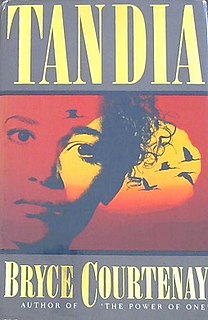
Tandia is Bryce Courtenay's 1991 sequel to his own best-selling novel The Power of One. It follows the story of a young woman, Tandia, who was brutally raped and then banished from her own home. Tandia later meets up with Peekay, the protagonist from The Power of One and their stories continue on together.
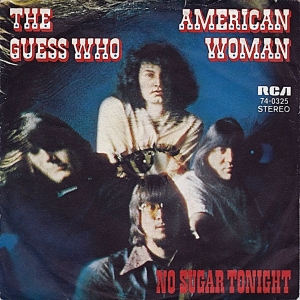
"American Woman" is a song released by the Canadian rock band the Guess Who in January 1970, from their sixth studio album of the same name. It was later released in March 1970 as a single backed with "No Sugar Tonight", and it reached number one for three weeks commencing May 9 on both the United States' Billboard Hot 100 and the Canadian RPM magazine singles chart. Billboard magazine placed the single at number three on the Year-End Hot 100 singles of 1970 list, and it was listed as number five for 1970 on the RPM Year-End Chart. On May 22, 1970, the single was certified as gold by the RIAA. It also reached the top ten in the Netherlands, Switzerland and Austria, and the top twenty in the United Kingdom and New Zealand.
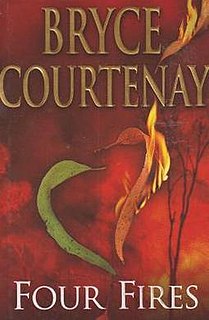
Four Fires is a novel written by Bryce Courtenay. It was first published in 2001.
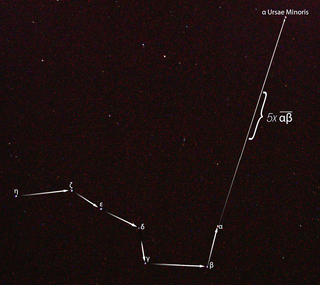
Songs of the Underground Railroad were spiritual and work songs used during the early-to-mid 19th century in the United States to encourage and convey coded information to escaping slaves as they moved along the various Underground Railroad routes. As it was illegal in most slave states to teach slaves to read or write, songs were used to communicate messages and directions about when, where, and how to escape, and warned of dangers and obstacles along the route.

The Potato Factory is a 1995 fictionalised historical novel by Bryce Courtenay, which was made into a television miniseries in Australia in 2000. The book is the first in a three-part series, followed by Tommo & Hawk and Solomon's Song. The Potato Factory has been the subject of some controversy regarding its historical accuracy and its portrayal of Jewish characters.
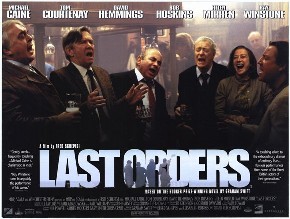
Last Orders is a 2001 British/German drama film written and directed by Fred Schepisi. The screenplay is based on the 1996 Booker Prize-winning novel Last Orders by Graham Swift.
John Bucchino is an American songwriter of both lyrics and music, an accompanist, a cabaret performer, and a teacher. He has been called "super-talented". Stephen Schwartz said his songs have "insightful lyrics and gorgeous melodies", "rich harmonic textures and subtle…inner voicings." His music has "beautiful intricacies."
There is a wide range of ways in which people have represented apartheid in popular culture. During (1948–1994) and following the apartheid era in South Africa, apartheid has been referenced in many books, films, and other forms of art and literature.
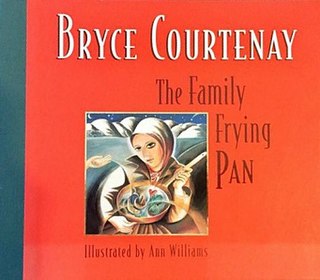
The Family Frying Pan is a fixup novel written by Bryce Courtenay. It was first published in 1997, then re-written and reissued in 2001.
The Power of One or Power of One may refer to:

" I'm Not Alright" is a song by Canadian duo Loud Luxury and American rapper and singer Bryce Vine. It was released on July 12, 2019 from Bryce Vine's album Carnival.

The Deep is a 2019 fantasy book by Rivers Solomon, with Daveed Diggs, William Hutson and Jonathan Snipes. It depicts a utopian underwater society built by the water-breathing descendants of pregnant slaves thrown overboard from slave ships. The book was developed from a song by the same name by clipping., an experimental hip-hop trio. It won the Lambda Literary Award, and was nominated for Hugo, Nebula and Locus awards.

















